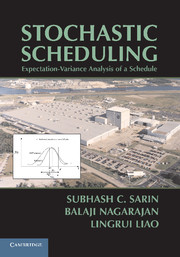Book contents
- Frontmatter
- Contents
- Foreword
- Preface
- STOCHASTIC SCHEDULING
- 1 Introduction
- 2 Robust Scheduling Approaches to Hedge against Processing Time Uncertainty
- 3 Expectation-Variance Analysis in Stochastic Multiobjective Scheduling
- 4 Single-Machine Models
- 5 Flow-Shop Models
- 6 Job-Shop Models
- 7 Parallel-Machine Models
- 8 The Case of General Processing Time Distribution
- 9 Concluding Remarks
- Appendix
- Bibliography
- Index
4 - Single-Machine Models
Published online by Cambridge University Press: 05 July 2014
- Frontmatter
- Contents
- Foreword
- Preface
- STOCHASTIC SCHEDULING
- 1 Introduction
- 2 Robust Scheduling Approaches to Hedge against Processing Time Uncertainty
- 3 Expectation-Variance Analysis in Stochastic Multiobjective Scheduling
- 4 Single-Machine Models
- 5 Flow-Shop Models
- 6 Job-Shop Models
- 7 Parallel-Machine Models
- 8 The Case of General Processing Time Distribution
- 9 Concluding Remarks
- Appendix
- Bibliography
- Index
Summary
Introduction
In this chapter we consider the problem of sequencing a given number of jobs on a single machine and devise methodologies and develop closed-form expressions (wherever possible) to compute the expectation and variance of various performance measures. Numerical illustrations indicating the significance and applicability of our work are also presented through example problems.
Besides being of significance in their own right, single-machine problems also constitute a good starting point for analyzing more complex scheduling environments of flow shop and job shop. The different performance measures that we consider for the single-machine case can be classified into two categories:
Completion-time-based, which includes total completion time (total flow time), total weighted completion time, and total weighted discounted completion time
Due-date-based, which includes total tardiness, total weighted tardiness, total number of tardy jobs, total weighted number of tardy jobs, mean lateness, and maximum lateness.
The processing time of a job is assumed to be a random variable that follows an arbitrary probability distribution.
First, we present the notation that is used in this chapter. Some of this notation has been introduced already in earlier chapters. However, we include it here for the sake of completeness.
- Type
- Chapter
- Information
- Stochastic SchedulingExpectation-Variance Analysis of a Schedule, pp. 43 - 65Publisher: Cambridge University PressPrint publication year: 2010



